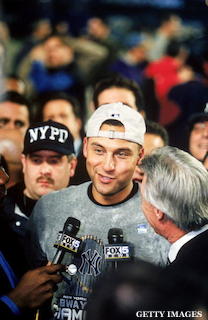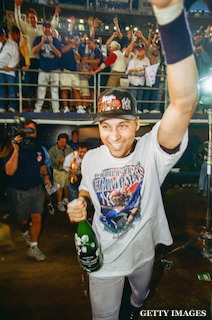
Derek Jeter is an enigma.
He is the face of a generation in America's pastime, an era that ends with his retirement after the 2014 season. He was the handsome centerpiece of baseball's most popular franchise.
Yet, there is so much we did not know, do not know and will never know about Derek Jeter.
That is the way he wants it and that is the way we should accept it.
According to baseball-reference.com, Derek Jeter has led the Yankees in Wins Above Replacement only three times in his 19 seasons. He never hit the most home runs or had the most RBI. One could make the argument Jeter has never been the Yankees' "best" player in any moment in time.
Jeter does not flaunt himself in the New York nightlife. He's dated celebrities, but some relationships are unconfirmed. (Last week, Jeter broke up with Sports Illustrated model Hannah Davis, also known as the DirecTV Genie. How many people knew he was dating her?) He's lived in extravagant residences, but never challenged his real estate critics.
The Internet is full of urban legends regarding Jeter. There is the Yeah Jeets story: A former girlfriend claims she saw a naked Jeter watching highlights of himself, pounding his chest and yelling, "Yeah Jeets. Yeah Jeets."
There are the stories of Jeter giving overnight guests at his Manhattan Trump World Tower apartment a gift basket in the morning. The baskets contain Jeter memorabilia (usually a signed baseball). Rumor has it he gave a second-time visitor the same gift twice.
We know when Justin Bieber speeds, we know when Miley Cyrus does drugs and we know when Kim Kardashian and Kanye West take selfies in a bathroom together.

Jeter? No such blemishes.
He will go down as one of the most liked, respected, skilled and innovative players in baseball history, if not the most under each of those descriptions.
In the most tainted era of Major League Baseball, Jeter guided his career in an exemplary manner for two decades. Jeter starred on the field and carried himself with responsibility off the field. He never missed a beat.
The list of achievements is staggering: Five world championships, 13 All-Star Games, five Silver Slugger Awards, five Gold Gloves, Rookie of the Year, All-Star Game MVP, World Series MVP Award, Sports Illustrated Sportsman of the Year, two appearances for the United States at the World Baseball classics.
He is the all-time leader in hits, games played, plate appearances, at-bats, stolen bases and singles (and strikeouts) for the sport's most storied franchise. He is the MLB postseason leader in games played, at-bats, plate appearances, runs, hits (by 72), total bases, singles, doubles and triples (and strikeouts).
He is going on 12 seasons as team captain, the longest run in Yankees history. He is the creator of the Turn 2 Foundation, a charitable organization founded in 1996, that helps children and teenagers avoid drug and alcohol addiction.

The world has seen its fair share of sports superstars' statistical success marred by personal controversy. Tiger Woods, O.J. Simpson and Pete Rose can attest to that.
For a score of years, Jeter was New York's golden boy. He was a winner, its most eligible bachelor and an active member of the community.
Jeter never fell victim to the venom of the New York tabloids. He never hiccupped. He never lost his sense of innocence.
Maybe Derek Jeter is an arrogant prick. Maybe he treats one-night stands like card show groupies. Maybe he thinks he is the greatest thing to happen to New York since Henry Hudson.
Maybe the idealized public perception of Derek Jeter as baseball's wonder child (now man) is based on fake principles. Maybe Jeter's presence of mind and PR team are the real All-Stars. Maybe we have wrongfully downplayed Jeter's flaws.
But that stuff never made it past the tabloids. We will take what we know about him.
Derek Jeter is a future Baseball Hall of Famer who won championships and set records with the New York Yankees. He is a man who followed the American Dream and became an icon. Individuals' career goals and personalities have been affected by Jeter.
Derek Jeter was born in Pequannock Township, N.J., and grew up in Kalamazoo, Mich. As the story goes, Jeter spent his childhood summers in New Jersey with his grandparents. He developed a fandom for the Yankees and dreamed of wearing pinstripes like his favorite player, Dave Winfield.

In the 1992 MLB draft, five teams passed on Jeter before the Yankees selected him sixth overall. Jeter played his first MLB game in 1995 and became a rookie sensation in 1996.
It is cliché to say someone "played the game right" unless that someone is Derek Jeter, the standard for the cliché. Jeter is not blessed with power and strength, but makes up for it with speed and precision.
Yankee fans remember Babe Ruth for the power, Joe DiMaggio for his consistency and Mantle for his natural skill. In Jeter's case, Yankee Universe will remember him for his clutch play, highlight-reel catches and timely base running.
Fans will remember "The Flip" in Game Three of the 2001 ALDS. Fans will remember Jeter's walk-off home run in Game Four of the 2001 World Series. Fans will remember Jeter coming up from the Yankee Stadium seats with a lacerated chin and bruised face after diving into the stands to make a 12th inning grab in a July 2004 game.
Personally, as someone born in 1993 in the New York suburbs, I saw Derek Jeter as the natural role model. I emulated Jeter's batting stance and studied his throwing motion. Most kids' backyard fantasy involves a walk-off home run or buzzer-beating jump shot. I imagined myself doing "The Derek Jeter Play," fielding a backhand deep in the shortstop/third base hole and making the jump throw to first base.
As a child, every time I beat my father in anything, whether it was table hockey or checkers, he would tell me I am lucky. "Derek Jeter's father never let him win at anything, but your mother won't let me do that to you," he would say.
Jeter was a role model for children and a role model for whom adults should mold their children after. He respected everyone and commanded respect from others.
I was at Yankee Stadium on July 11 when Jeter made his 2013 debut. He missed more than three months with an ankle fracture he suffered in the 2012 postseason. After the game, he hobbled to his press conference with a quadriceps strain that would put him right back on the disabled list.
I had covered him before, but this was my first Jeter press conference. The aura of the room was unique. Jeter treated reporters like colleagues, but not friends. He alluded to a conversation he had with WFAN reporter Sweeny Murti the previous day. He addressed reporters by first name and was candid with his answers.
Newsday's David Lennon asked Jeter if he makes concessions to his age being 39.
Jeter looked him in the eye and chuckled. "We're all getting older here. I mean, I knew you when you were a lot younger," he said.
It dawned on me many of the reporters had spent decades with Jeter. Considering Jeter's enigmatic qualities, these reporters knew more of Jeter than was available in public knowledge. On or off the record, if the guy ever had a loose end, these reporters knew it.
All I witnessed was respect from both sides. In his answers, he was a professional who answered questions honestly, but not controversially. Reporters asked informative questions, but did not press if Jeter signaled he would not go into deeper answers.
Besides, it would be foolish to expect Jeter to crack.
Derek Jeter is the most famous active baseball player. He may be among the top five most recognized players alive. He is a sure Hall of Famer whose name will be at the forefront of Yankee history for at least a century.
And he is a mystery. But that is OK. All human beings have flaws. At least Jeter's are minuscule enough to be kept under wraps despite his enormous fame.
Let's take Derek Jeter for what he is: A 20-year treat for sports and society.




